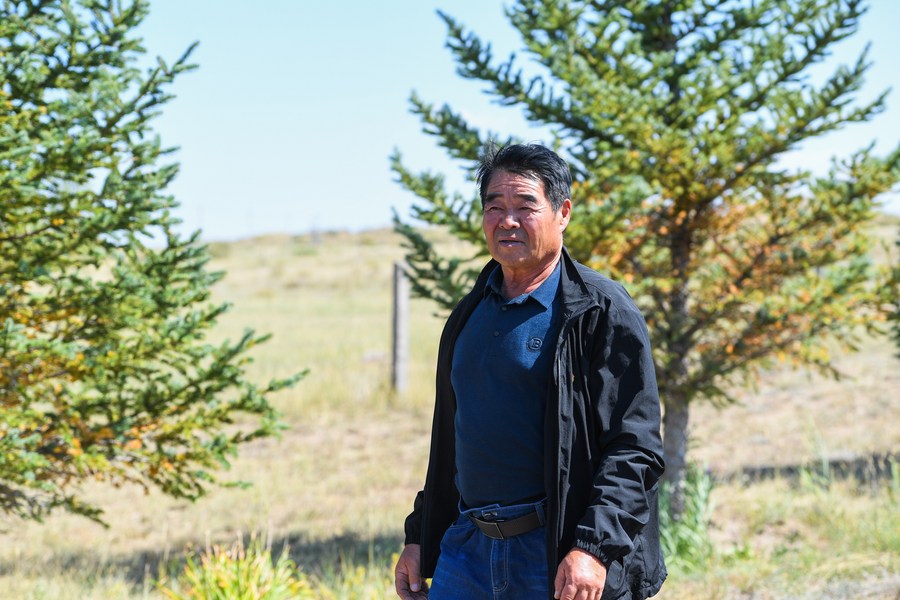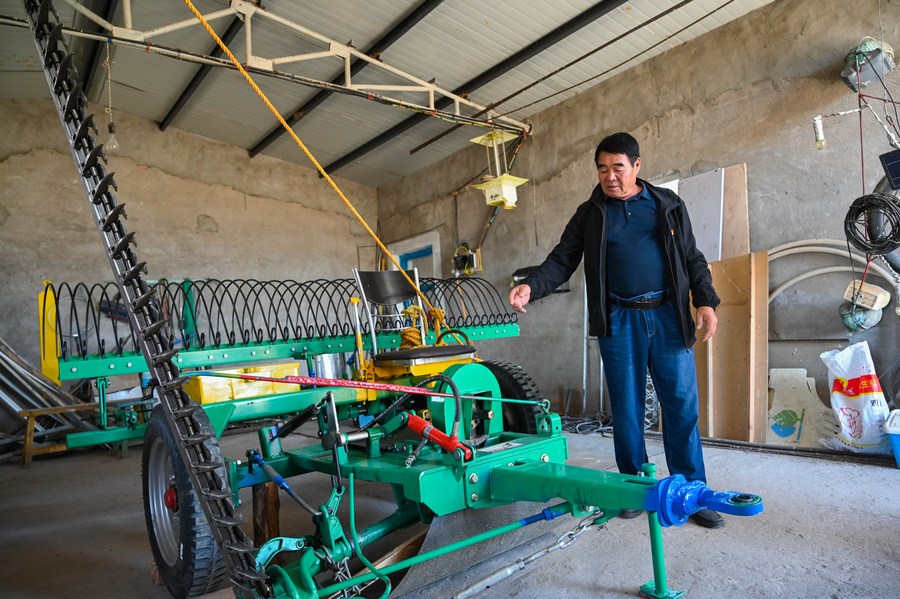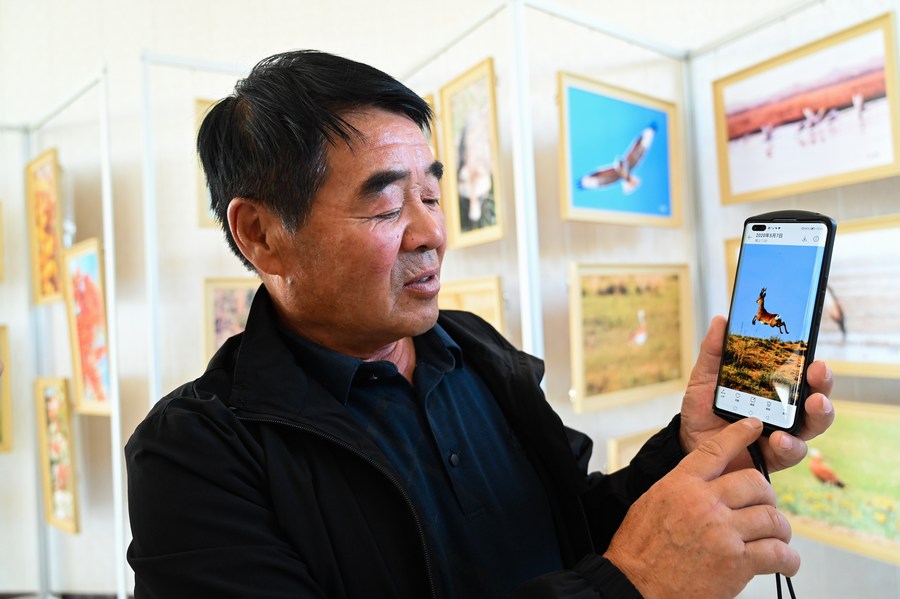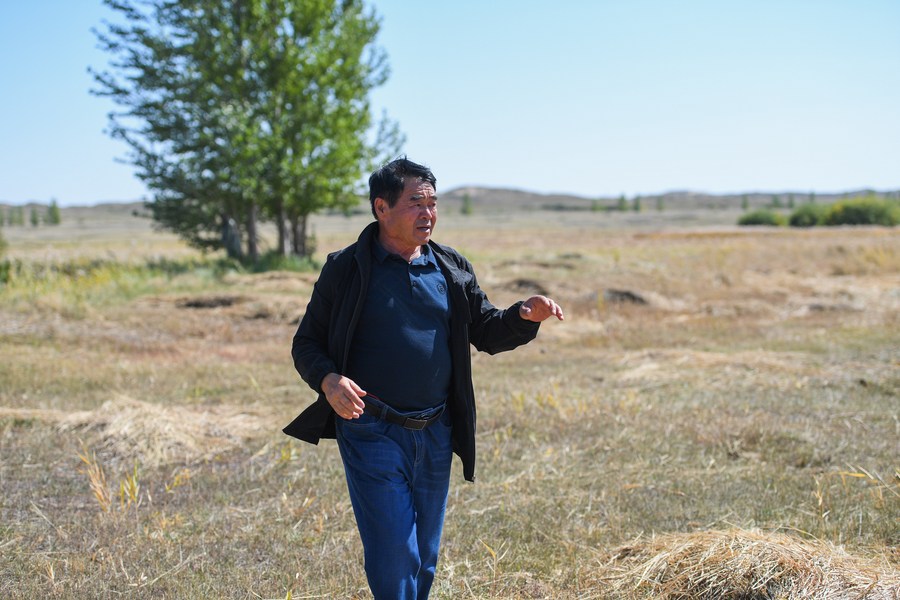Herder devoted to improving life through grassland conservation
10:07, October 09, 2022 Xinhua

Ting Bater works on his pasture in Sarultuya Village of Abag Banner, north China's Inner Mongolia Autonomous Region, Sept. 8, 2022. (Xinhua/Liu Lei)
HOHHOT, Oct. 8 (Xinhua) -- Ting Bater, a delegate to the upcoming 20th National Congress of the Communist Party of China (CPC), is awake early to prepare tools, drive a lawnmower to his pasture and harvest his crops.
"These cut grasses are left in the grassland, and the livestock can eat it during the winter, which saves manpower. The scattered grass seeds can grow more new grass in the coming year, which is good for the grassland ecology," Ting told several visiting herders.
Born in Hohhot, the capital city of north China's Inner Mongolia Autonomous Region in 1955, Ting left his hometown after graduating from senior high school and started to work in Sarultuya Village of Abag Banner in 1974.
In the ethnic Mongolian language, Sarultuya means "bright glow." But Ting remembers that life there was far from being bright at that time.

Ting Bater checks tools in Sarultuya Village of Abag Banner, north China's Inner Mongolia Autonomous Region, Sept. 8, 2022. (Xinhua/Liu Lei)
The yurts where herders lived were poorly lit and had only patched felt. Many households did not even have decent bedding.
"The villagers, however, shared their best food with us," Ting said, adding that his determination to help his fellow herders live good lives has become firmer since then.
In those years, Ting quickly adapted to pastoral life. He asked herders for advice and studied hard, and soon learned to mow grass and repair fences. At 21, he joined the CPC. Ting decided to remain on the grassland.
In 1993, Ting began to work as the Party secretary of Sarultuya Village.

Ting Bater shows a wildlife picture he took on his pasture in Sarultuya Village of Abag Banner, north China's Inner Mongolia Autonomous Region, Sept. 8, 2022. (Xinhua/Liu Lei)
Located on the northwestern edge of Hunshandake Sandland, Sarultuya Village is situated in a fragile ecological environment. For years, Ting took the lead in planting trees in areas with serious desertification, building a sand cypress reserve and two yellow willow bases.
In 1998, he proposed raising cattle instead of sheep to curb desertification.
In 2010, with the support of the local government, a training center for farmers and herders was built near Ting's house. Inside the center are illustrated exhibition boards introducing Ting's experience in developing animal husbandry, as well as in conserving the pasture's ecological environment and wildlife.
"As long as he takes the lead, we will follow suit," herder Yun Liang said. "My family now has a net income of more than 300,000 yuan (about 42,000 U.S. dollars) a year, and the grass is growing well."

Ting Bater views his pasture in Sarultuya Village of Abag Banner, north China's Inner Mongolia Autonomous Region, Sept. 8, 2022. (Xinhua/Liu Lei)
As a paragon of hard work who has spent decades helping improve the lives of herders in border areas, Ting received the July 1 Medal, the highest honor in the CPC, in 2021.
When it comes to his future plans, Ting says he will continue to devote himself to ecological protection and rural vitalization. "I will work with fellow herders to protect the grassland, and work for a better life."

